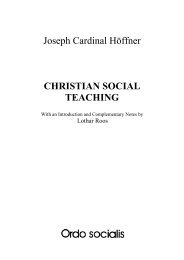Prof. Franz Josef Stegmann Bethlehem Social ... - Ordo Socialis
Prof. Franz Josef Stegmann Bethlehem Social ... - Ordo Socialis
Prof. Franz Josef Stegmann Bethlehem Social ... - Ordo Socialis
Create successful ePaper yourself
Turn your PDF publications into a flip-book with our unique Google optimized e-Paper software.
<strong>Stegmann</strong><br />
person is the primary route that the Church must travel in fulfilling her mission ... the way<br />
traced out by Christ himself'; because of that, "care and responsibility for the human person"<br />
are "her sole purpose”. 3<br />
What, however, is the nature of the relationship between Christian faith and the shaping of the<br />
secular world? In the course of struggles between popes and emperors in the Middle Ages,<br />
Pope Boniface VIII claimed that the spiritual authority has the right and power "to institute<br />
and appoint the secular authority and to pass judgement on it" 4 (terrenam potestatem<br />
instituere et judicare). In contrast, the Second Vatican Council firmly declared that there is a<br />
"rightful independence" and "autonomy of earthly affairs". 5 This remarkable change on the<br />
Christian side, in addition, underlines the importance of our question.<br />
The following remarks do not intend to deal completely with every aspect of this complex<br />
issue. They aim rather to give a general overview and some hints of orientation. The first<br />
focus of attention will be "rightful independence" and the "autonomy of earthly affairs" (1). In<br />
a second step, the connection between Christian faith and economic action and political<br />
commitment is considered (2). The third section describes the Christian understanding of the<br />
human being as a person, the basis and heart of Christian <strong>Social</strong> Teaching (3). This is<br />
followed by comments on the main social principles for shaping a human society, which are<br />
deduced from this understanding (4). Short remarks on the development of Christian <strong>Social</strong><br />
Teaching and its task form the closing section (5).<br />
1. AUTONOMY IN SECULAR FIELDS OF LIFE<br />
1.1 No direct political mission of the Church<br />
The Church – the community of those who believe in the God of Jesus Christ – received the<br />
commandment from her founder to continue his work of salvation by proclaiming his message<br />
and by celebrating his sacraments. Her task is the salvation of human beings by the<br />
glorification of God through the following of Christ. The Church as an Institution therefore<br />
does not possess a direct political, economic or any other secular mission.<br />
In this context, "Christian salvation" must be distinguished from "human welfare". Christian<br />
salvation in its fullness and perfection is the "eschatological gift" of the coming Lord at the<br />
end of time, but it also has an earthly dimension. One may say: real human welfare on earth is<br />
the beginning of eschatological salvation, of eternal perfection, and will be part of this eternal<br />
perfection. And Christian salvation – in its fulfilment, eschatological salvation – is the continuation<br />
and perfection of true earthly, real human welfare; a perfection that we cannot<br />
imagine in this life. In theological terms, we have to distinguish the "order of creation" and<br />
the "order of salvation", but basically they are one reality. The Second Vatican Council<br />
described this issue precisely:<br />
"Earthly progress must be carefully distinguished from the growth of Christ's kingdom."<br />
Its expectation, however, "must not weaken but rather stimulate our concern for cultivating<br />
this earth". For we shall find "again the values of human dignity, brotherhood and freedom,<br />
and indeed all the good fruits of our nature and enterprise ... freed of stain, burnished and<br />
transfigured ... when Christ hands over to the Father a kingdom eternal and universal". We<br />
3<br />
John Paul II, On the Hundredth Anniversay of Rerum Novarum – Centesimus Annus (1991), No. 53, 1.<br />
4<br />
Boniface VIII, Bull Unam Sanctam (1302), in: Hubert Jedin (Ed.), Handbuch der Kirchengeschichte, Vol. III/2,<br />
Freiburg 1968, 353.<br />
5<br />
Second Vatican Council, Pastoral Constitution on the Church in the Modern World – Gaudium et Spes (1965),<br />
Art. 36,2,4.<br />
5















